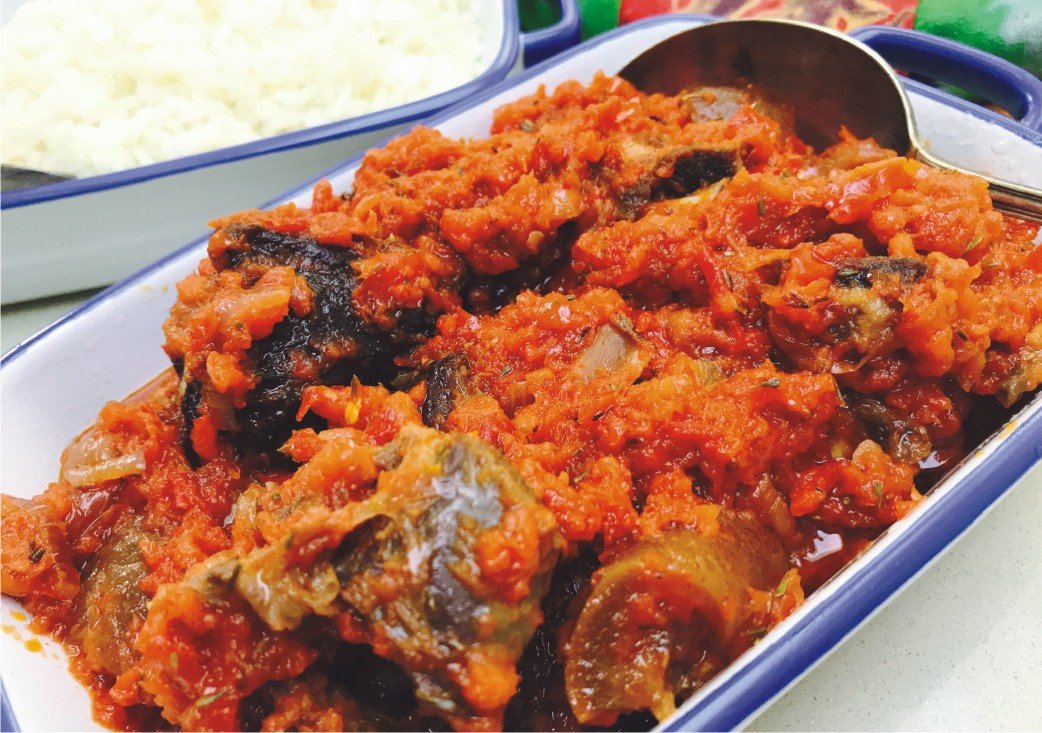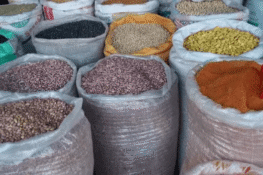Recently, a foodie friend (The Hunter Gatherer, as I call him) and I were having a chat about what makes a good Nigerian Cook … this got me thinking. Various thoughts went through my mind: which dishes are viewed as quintessentially Nigerian? Jollof, Egusi Soup, Okro Soup, Rice & Stew, Moi-Moi, Akara and so on. My thoughts then drifted to which basic skills are required and then what it is that differentiates a Nigerian cook or chef from other nationalities.
The Hunter Gatherer made me laugh when he said that the key differentiator was “a Nigerian Chef needed the knowledge that removing geology from ingredients is a necessary evil”. Funny, but true, when you think about it. Almost every cooking task starts with the removal of sand and stones from the ingredients. Chai! I am pretty sure that most Nigerian children have “fond” memories of being given a tray of beans or egusi and told “Oya, sit there and remove the stones”.
I certainly do! Who doesn’t remember having to pick an interminable number of leaves off stems and then the arduous task of ensuring they are sand-free?!
This is probably why many Nigerians feel that our food is hard to cook. Whilst this is true to some extent, particularly as regards the preparation, there are several ways of getting around this. Master two key basics: a good stock and a good tomato stew (sauce) and you are on your way to mastering the “Art of Nigerian Cooking”. These two form the basis of many dishes but more about these a bit later on.
How do I deal with sand and stones, our greatest bugbears?! Over the years, I have come up with a few kitchen hacks to deal with most situations.
I will use beans as an example for dealing with stones. As a child growing up in Nigeria, every bean dish started with picking out stones; be it Akara, Moi-Moi or Beans Pottage, before soaking. A few years ago, it occurred to me that an easier way of dealing with the stone problem was to soak the beans right from the start and use a pink colander with extra large holes that would allow any stones to fall through but not the water-engorged beans. As an extra precaution, I also bought a large white enamel bowl. The latter has two purposes: any sand is evident at the bottom of the bowl as one rinses the beans with copious amounts of water; secondly, one can also hear the sound of any “stubborn” little stones rattling around in the bowl.
People say “experience is the best teacher”. Many years ago, I ordered some Onugbu (Bitterleaf) Soup from a Nigerian restaurant in London. Got home to find the first and second mouthfuls were grainy – not from anything delicious, but from sand! My people say, “You do not have to tell a deaf man that war has started”. With bitter (no pun intended) disappointment, I threw the rest away. Roll on several years and people would start to pay me to cook for them. I was paranoid about sand whenever anyone ordered any type of soup that involved vegetables. I would stand for hours at the sink, tap running, washing away, sometimes down to single larger-leaved vegetables such as Ugu and Onugbu.
The enamel bowl and pink colander, together with advice from a couple of good friends, would eventually come to the rescue. Soak the leaves with plenty of salt and water in the bowl for about ten minutes. The salt helps to kill any nasties according to my sister-friend, Chinwe, and will help drag the sand to the bottom of the bowl said my cousin, Akosa. Several rinses using the large-holed colander and the enamel bowl and you can be certain your leaves are sand-free. Akosa has a slightly different technique from me: he cuts the leaves before the salt-water-rinse action.
Hopefully, you are not too worn out by now to try out what I think are the two pinnacles of Nigerian cooking. Indeed, you can probably get through without having to deal with sand and stones. Remember I spoke about Stock and Stew?
I am “notorious” for cooking without using commercial stock cubes, something almost every Nigerian I have come across finds hard to believe. “How do you do it, Nky?”, they ask.
First of all, I start with good quality ingredients. Additional flavours come from a good stock and seasonings that our grannies would have used such as Crayfish, Iru, Ogili (Ogiri), Dawdawa that add the umami punch, you know, that je ne sai quois?
In my opinion, Nigerian Soups fall into two main categories: those that need thickening (most vegetable soups) and those that self-thicken such as Egusi and Okro. One thing all have in common is a flavorsome meat or fish stock.
I tend to cook a large batch of meat and stock fish and then freeze in meal-size portions together with the cooking liquor. This makes whipping up a speedy soup on impulse really easy. Use any combination of meat that you fancy. Nigerians are not afraid to mix various meats and indeed together in the same dish. I add stock fish and crayfish in with the meat as the fishy flavour permeates the meat, making it extra delicious.
Make fish stock by boiling together caramalised fish bones, seafood shells; and stockfish bones and trimmings.
Tomato Sauce aka “Stew”. That’s what we call it: “Stew!”. It may be a sauce or a salsa to the rest of the world; we call it “stew”. Verbose though we may be with certain things, when it comes to food, we are perfunctory. We don’t have fancy names for any of our dishes, they are all purely functional – okra soup (actually, a casserole, but that’s another story) is exactly “what it says on the tin”; rice means boiled rice – jollof or fried, if you would like something more fancy; and so on!
On a more poetic, or shall I say, a more sophisticated, note, just like the ‘sofrito’ and ‘mirepoix’ of Latin and French cuisines form the basis of many delicious dishes, so does the Nigerian “stew”; a blend of onions, chilies and tomatoes. Everyone has their own way of making it, with the proportions of each of the trio dependent upon personal taste. I sometimes substitute all or some of the tomatoes with red bell peppers if I want a slightly sweeter sofrito (or stew!). The latter with the bell peppers is my favourite way (and most appreciated by others) of making stew. Known in my house as “Uncle Benson’s Warri Stew”. Why Uncle Benson’s Warri Stew? He’s my sister-friend Chinwe’s husband and when I mentioned years ago that I was writing a Nigerian cookbook, he said I must include Warri Stew. Use this stew as a base to make Jollof, Rice and Stew, Beans and Stew, Moi-Moi, even non-Nigerian dishes such as Pizza, Spaghetti Bolognaise and other tomato-based pasta dishes, Chili Con Carne and Pizza.








